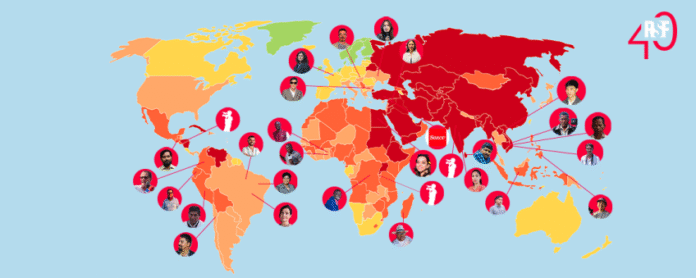Reporters Without Borders (RSF) on Monday listed Turkey as among the countries harassing journalists for covering environmental issues, highlighting the growing risks faced by reporters who investigate deforestation, mining and corporate abuse.
In its latest report documenting 30 cases worldwide, RSF cited the judicial harassment of 26 Turkish journalists affiliated with the pro-opposition Sözcü daily faced over their coverage of deforestation projects and gold mining operations.
The legal complaints were filed by businessman Mehmet Cengiz, the owner of Cengiz Holding, a conglomerate frequently criticized for environmentally destructive practices, who is known for his close ties to President Recep Tayyip Erdoğan. Cengiz accused the reporters, writers and editors from the Sözcü daily and its online edition under multiple articles of the Turkish Penal Code (TCK), including “disturbing peace and tranquility,” “inciting hatred and enmity among the public,” “spreading misleading information,” “inciting non-compliance with the law” and “insult and defamation.”
The complaints stem from 174 news reports, some of which included parliamentary
speeches and public statements made by lawmakers in the Turkish Parliament regarding Cengiz Holding’s construction and mining projects.
RSF noted that in September, a judge ordered the censorship of at least 15 articles published from April to August whose content he deemed “likely to undermine national security and public order.”
Cengiz and his conglomerate first came to public attention in late 2013, when Turkey was shaken by the news of two corruption investigations in which senior ruling Justice and Development Party (AKP) government politicians were involved.
Cengiz is among five businessmen who are referred to by Turkey’s opposition parties as the “gang of five” for having won nearly all the large tenders during the time in office of President Erdoğan.
RSF also called on governments to ensure that the defense of reliable reporting and its actors is a key component of the fight against climate change.
According to Expression Interrupted, a press freedom monitoring group, 28 journalists are currently behind bars in Turkey. The country’s deteriorating media landscape was further pointed out in the 2025 World Press Freedom Index published by Reporters Without Borders (RSF), where it was ranked 159th out of 180 nations.






![[UPDATE] Journalist put under house arrest over reporting on opposition figures](https://stockholmcf.org/wp-content/uploads/2025/09/Furkan-Karabay-218x150.webp)








